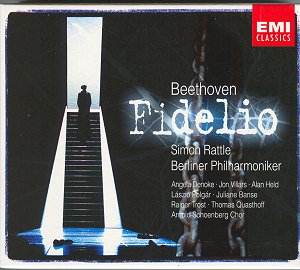When Simon Rattle’s
recent set of the Beethoven Symphonies
with the Berlin Philharmonic was released,
there seemed a certain amount of (understandable)
scepticism from some critics. The basic
problem could be summed up as ‘do we
really need another set of these pieces?’
The general consensus was that Rattle
just about got away with it, providing
those elements of rediscovery and insight
that we know he is so good at, coupled
with the superb playing of the orchestra.
It strikes me that
all the same questions apply here, but
the answers are much trickier to pin
down. Out of all the great operas in
the repertoire, Fidelio has been
exceptionally lucky on disc. From my
own collection and those of friends
I can cite at least half a dozen classic
sets which stand the test of time. Among
‘old timers’ are famous recordings from
Klemperer, Fürtwängler, Fricsay
and Böhm. Recent frontrunners include
Haitink, the ever-theatrical Bernstein,
Mackerras, and even more recent sets
of note from Harnoncourt and a marvellous
Naxos bargain from Michael Halasz. Basically,
just about everyone has had a go at
Fidelio, and even though the
casts on these sets vary enormously,
this new Rattle recording enters the
most crowded arena imaginable.
So how do the results
stack up? Well, for a start I find myself
agreeing with those critics who were
disappointed when comparing Rattle with
himself of a few years earlier. He conducted
a memorable series of productions at
Glyndebourne, never released commercially
but broadcast on radio and TV, where
the sheer rawness and vitality still
resonate. The band was his favourite
Orchestra of the Age of Enlightenment,
and I found myself longing for that
element of danger and energy. Yes, this
new recording is ostensibly ‘live’ (patched
from concerts) but it is evident from
the overture that a spark is missing.
There is weight and power in abundance,
but I find it all a bit ‘bottom heavy’,
with those super-smooth strings and
fruitily rounded horn playing. The basic
tempo is around the Klemperer mark (ie.
slowish) but the old man’s superb ear
for detail, combined with the Philharmonia’s
response, give that reading an extra
dimension. Still, one does get swept
up in the music making, which is certainly
enjoyable on its own terms and, given
the artists, to be expected. In fact
the overture sums up the conducting
and orchestral contribution throughout
– refined, smooth, tempi fairly relaxed
but with an all round homogeneity that
is hard to fault. So what is niggling
me?
Well, this is an opera,
so quite a bit of the blame has to lie
with the singers. The marvellously perceptive
Juliane Banse, an artist I admire, is
simply too matronly for the girlish,
naïve Marzelline. The fresh, eager
portrayal of Ingebord Hallstein (for
Klemperer) is far preferable. On the
other hand, I like the youthful impetuosity
of Rainer Trost, who makes a convincing
Jacquino. The two just don’t gel as
a couple.
In the leading role
of Leonore, we have an extremely intelligent
assumption by Angela Denoke. She makes
us believe in her desperation and determination
at the same time, a difficult balancing
act. Vocally she does show some strain
in the upper register, and while her
‘Abscheulicher!’ does not pin one to
the seat like Christa Ludwig’s stunning
rendition, she is never less than enjoyable
throughout the opera.
Partnering her as Florestan
is Jon Villars, who sounds even more
strained when the going gets tough.
It is a different sort of strain to
Jon Vickers (Klemperer) who always makes
it sound suitably like it is the character’s
(understandable) stress we are encountering.
Villars just emits a rather ugly vibrato
when much above the stave. He does try
to compensate with some nice pianissimo
head voice in places, but in the end
one misses the sheer manly, vocal splendour
of Vickers, Patzak (for Fürtwängler)
or, more recently, Peter Seiffert for
Harnoncourt.
The experienced Laszlo
Polgar is in excellent form, and even
though we are a few years on from his
recording of the same part for Harnoncourt,
the voice still has a strong, beautifully
rich quality. Thomas Quasthoff’s Don
Fernando is one of the best things on
the set, and his noble baritone and
way with the text are exemplary. Alan
Held’s Don Pizzaro does disappoint slightly,
but I have to admit to being used to
the black-voiced authority of Walter
Berry, again for Klemperer.
So individual performances
are something of a mixed bag. But is
has to be said that the voices work
well where ensembles, which pepper the
opera, are concerned. Take the great
Act 1 quartet ‘Mir ist so wunderbar’
where Rattle’s rather plodding tempo
is offset by superb balance from the
singers, or the Act 2 trio ‘Euch werde
Lohn in besser’n Welten’, where Florestan,
Rocco and Leonore effortlessly weave
together. The Prisoner’s Chorus at the
end of Act 1 ‘O welche Lust’ has a suitable
feeling of (literal) release, but is
neither as emotionally direct as Klemperer
or as overwhelmingly passionate as Bernstein.
The spoken dialogue
(always a bone of contention in Fidelio
recordings) has been mercifully cut
to a minimum, and does at least sound
as if it’s being spoken by the singers
rather than actors (at least to my ears).
Notes and presentation are good, and
the set is in the mid-price category.
If this is ultimately something of a
disappointment, it is purely because
of the high standards and levels of
expectation Rattle has himself set,
particularly given those Glyndebourne
performances. It’s true this set came
shortly after a stage run and was taken
from ‘live’ concerts, but it never generates
the sort of tension or electricity we
know Rattle is capable of. When you
know you can get exactly those qualities
in classic sets elsewhere, it’s difficult
to see this version toppling existing
recommendations.
Tony Haywood
